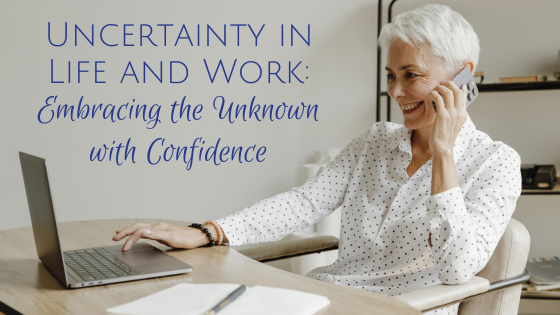Uncertainty in Life and Work: Embracing the Unknown with Confidence
/Many people feel uncertain about the world at the moment. The global situation, political upheaval domestically and internationally, the cost of living, the employment market, and interest rates are just a few of the areas where we are experiencing uncertainty and unrest.
Indeed, uncertainty is a familiar companion for many of us, a shared experience that touches the lives of many of my friends and clients. It's a thread that leads some to tread cautiously in decision-making, while others find it ignites a more adventurous spirit in certain aspects of their personal lives. Yet, they remain cautious and thoughtful in their day-to-day careers.
Different approaches to uncertainty
When faced with uncertainty, individuals often react in diverse ways. Some may adopt a more cautious and hesitant approach to decision-making, striving to mitigate risks and avoid potential negative consequences. If this sounds like your approach, you’re leaning into the strengths of prudence or self-regulation, taking your time to analyse the situation, gather information, and consider all possible outcomes before making a move.
Conversely, others may respond to uncertainty by embracing a more daring and impulsive attitude in certain areas of their lives. If this is more like you, you are leaning into the strengths of bravery, zest, or perseverance. You may feel that since the future is uncertain, you should relish the present and take risks you would generally avoid. This could manifest in various ways, such as engaging in risky behaviours, making impulsive decisions, or pursuing short-term gratification.
However, it's worth noting that even those who seem more reckless in their personal lives may still be more considered and deliberate in their work or other areas of their lives where the stakes are higher. They may compartmentalise their decision-making and take calculated risks in places where they feel more confident while being more cautious in less familiar or unpredictable areas.
Uncertainty in Personal and Professional Life
Similarly, when making decisions about my coaching business in times of uncertainty, I think things like, “I could start focusing on this to help with this,” or, “I could create this to cover this concern.”
As a coach, I've often found myself grappling with uncertainty. I've learned to lean into my signature strength of love and provide support, care, and kindness to those I serve—my clients and readers. Uncertainty triggers a series of 'what-ifs' in my mind, and I strive to cover all my bases in as many ways as possible.
Sound familiar?
We can feel anxious and stressed when faced with Uncertainty
When we're faced with uncertainty in our careers and lives, we often take a similar approach. We start considering all the possibilities and want to cover all our bases. This is a natural response to uncertainty, and many of us can relate to it.
But still, uncertainty is there every step of the way, tapping us on the shoulder and saying but what about this? Or what happens if…?
Uncertainty in our career can look like this:
Jumping from one company or role to another without a clear idea of what we actually want to do.
Doubting our abilities, we continue seeking more information or enrolling in another course or program.
Rash decision-making, making no decision at all, or sticking with the status quo. Neither approach is necessarily wrong, but neither is necessarily good.
Uncertainty often makes us want stability, security, and more options. These are counterintuitive—for stability, we want to hold onto what we have and reinforce our connection and value. But more options may mean we want to explore alternatives. It can be exhausting to try and do both!
Desire for Stability and Growth
Humans are wired for stability and growth, especially in times of uncertainty
Our minds naturally seek stability and security, especially when things are uncertain. We want to hold onto what we have and feel safe. But at the same time, we're curious and want to explore new things. This desire for more options can sometimes clash with our need for stability, leading to confusion and exhaustion.
Consider a new job opportunity. On one hand, you may value the stability and security of your current role, especially if you've invested time and effort into it. On the other hand, the new opportunity may ignite a spark of curiosity and the potential for personal and professional growth.
Experiencing tension as you navigate uncertainty is not a sign of weakness but a testament to your desire for stability and growth. It's a natural part of the process; there is no one-size-fits-all solution! You're not alone in this journey, and it's okay to feel this way. To find your own balance, aim to understand your values, strengths and goals and make decisions that align with them. This can help you navigate uncertainty with more confidence and clarity.
So what can we do?
When uncertainty looms over your career and life, the power of self-reflection to enhance self-awareness cannot be overstated. Choosing to engage your strength of curiosity will assist as you explore options to ease your feeling of uncertainty. To support you to do that, here are some guiding questions to steer you through this process, empowering you to take charge of your journey.
Four Guiding Questions for Navigating Uncertainty
So before you go letting uncertainty lead to enrolling in another course, changing jobs, or feeling stuck, ask yourself the following questions:
Do you have capacity?
1 - Do I have the capacity for this?
I know I don't have the capacity for all the new business ideas I’d love to pursue! Thus, your capacity is an important consideration when addressing uncertainty.
Firstly, ask yourself, “Do I have the capacity to continue dealing with and managing my current load?”
Consider and assess your workload and workload capacity. It's important to be honest about whether you’re overwhelmed or stretched too thin. If you’re struggling to keep up with your current load, it may be time to re-evaluate your priorities, delegate some tasks to others or consider another shift.
The second question you should ask is, “Do I have the capacity for change?”
This is about looking ahead and assessing your ability to adapt to new situations or challenges, including the potential for a new role or learning programme. Yes, change is a constant in life. As adults, we also know that all change, whether wanted or not, requires work, time, and energy. If you're stuck or resistant to change, exploring why that is and working on building your resilience and adaptability skills may be helpful.
2 - Do I need more/something new, or can I tweak what I already have?
While something new or more can be exciting, fun and challenging, it’s not always necessary or advised.
In terms of our career, this is where working with your strengths comes into play. Nearly every client I have worked with has been able to improve their feelings about their job with a few strategic tweaks. These are not significant changes but tiny adjustments to how they interact, think about or tackle issues at work.
Taking time to reflect upon your exisiting skills and Strengths can be beneficial
Therefore, I am a proponent of identifying the skills you already have, and your strengths are part of this and then use them to help improve your situation and alleviate the sense of uncertainty.
Along these lines, I've been contemplating how to bring my strengths to the forefront of my business, including my coaching and writing. I am currently exploring ways to revitalise my existing articles, products, resources, and offers and repurpose them creatively to add more value to you, my clients, and my readers.
3 - Am I doing this out of logic and reason or out of emotion and worry?
Journalling your answers to these questions can be powerful
This is one of the most challenging questions. Even, or perhaps especially, in times of uncertainty, you still need to act with a healthy dose of logic and reason in your career, business, and life in general.
It’s a truism that life is full of uncertainties, and it's okay to feel overwhelmed or unsure about what to do next. However, regardless of how overwhelming or uncertain your circumstances, making decisions based on logic and reason is essential, especially when considering a significant life change, such as changing jobs or careers. Any significant career change requires careful planning, analysis, and strategic thinking, especially in times of uncertainty.
To assist, I recommend taking a step back and approaching the problem with a clear and level-headed mindset. At a practical level, this means gathering as much information as possible, considering potential outcomes, and weighing the pros and cons of each option. It also means being honest with yourself about your skills, strengths, and limitations and seeking advice or support from a trusted friend, mentor or confidante. A professional coach (that’s me!) can also assist as a sounding board.
4 - What’s my plan?
When faced with uncertainty, humans often act impulsively or without proper planning, hoping to solve their problems. However, this approach rarely works, especially when it comes to dealing with the emotions that accompany uncertainty, such as anxiety and worry.
Making a Plan is key to taking action and boosting your confidence
Instead of taking a haphazard approach, it's essential to have a plan in place that is based on logic and reason. This plan can help you identify your worries' root causes and develop a strategy to address them effectively. Having a plan can also give you a sense of control and confidence, which can help alleviate the anxiety and worry you may be experiencing.
It's important to note that while having a plan is crucial, it's also essential to avoid overwhelming yourself. An overly complicated or unrealistic plan can lead to more stress and anxiety. Therefore, it's crucial to balance having a solid plan and not overloading yourself with too many tasks or responsibilities.
Finally, creating a plan doesn't necessarily mean drastically changing your life, such as changing jobs or taking on more responsibilities. Instead, small, incremental changes can often be more effective and manageable. By taking a step-by-step approach, you can gradually work towards your goals without feeling overwhelmed or burnt out.
In summary, the response to uncertainty is highly individual and complex, and there is no one-size-fits-all approach. It's essential to recognise that both caution and risk-taking can be valid strategies depending on the situation and one's personal preferences and values. What matters most is that you make an informed decision that aligns with your values, goals, and priorities.
If you are struggling with uncertainty right now, I have three suggestions for you.
1.The A to Z of Career and Life Confidence
The A to Z of Career and Life Confidence captures the essence of what it means to be confident, gleaned from many years of career and life coaching. The ebook covers an alphabet’s worth of ideas to move you from uncertainty to confidence, including practical steps to support you in boosting your confidence in your career, business, and life. And it’s completely free.
2. Design Your Season
Design Your Season is my DIY solution to feeling stuck and uncertain. This self-guided workshop and workbook will help you plan and create a memorable, productive, and fulfilling season or quarter. Answering the included prompting questions will give you clarity, helping you move into action. Farewell uncertainty! And because it's a digital product, you can use it repeatedly.
3. Clarity Kickstart
Clarity Kickstart Coaching provides a clear way forward, empowering you with confidence, calm, and inspiration. Discover your signature strengths and tackle any obstacle with ease. You will walk away feeling confident in yourself and your decisions, knowing that you’ve got this! Kick uncertainty to the curb with a Clarity Kickstart.
Of course, it may be that none of these options looks appealing right now. In that case, the simple act of taking a step back and addressing the four questions above will help you cultivate more clarity when battling anxiety-inducing uncertainty.
More support
If you’re seeking more support and are keen to experience more joy, boost your confidence, love your life and career, and aren’t sure where to start, my signature Confidence Package may be the answer. This transformative coaching experience helps you feel clear and confident in your career and life. With six one-on-one individual coaching sessions, the process starts with a complimentary consult, during which we can determine if coaching with me is right for you. Get started today—simply book your call.




















